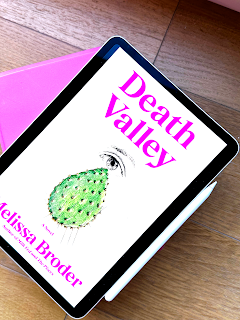Death Valley by Melissa Broder: book review
Death Valley by Melissa Broder
Overview: The narrator decides to take a trip to the desert to leave behind her problems in Los Angeles and maybe find some inspiration to write her next novel at a pleasingly bland Best Western off the highway. Instead, she finds a hiking trail and a magical cactus that gives her a portal through which to explore her grief about her father's time in the ICU and her struggle with her husband's worsening chronic illness. The desert offers both catharsis and peril as she spends a few days confronting life, death, and nature. Overall: 5
Characters: 5 Melissa Broder has such a strong and unique voice that it makes our narrator spring off the page. It's the kind of voice that justifies spending almost the whole book within one person's never ending inner monologue. She's all consuming, sharp, witty, and searingly honest. This book delivers exactly what no plot just vibes literary fiction is supposed to be. The narrator also walks the perfect fine line of being so blunt and brutally honest that she could fall into the "unlikable" character archetype for some, but it's in a super relatable way where she's expressing a lot of what all of us think but know we're not supposed to say (or maybe I just think, who knows). This character springs to life through the extremely specific way she chooses to explain the world around her, and there's just so much depth created from it.
Most of the direct interactions that happen in this book are with the two Best Western front desk employees, Jethra and Zip. She has weirdly resonant and important small talk with these two, and it's Jethra that sets her off down the trail where she finds the magical cactus. These interactions show her desperation for connection, but Jethra and Zip are oddly fully realized for the small amount of time they're given on the page.
We also get to know her family, mostly through flashbacks or small interactions. Her husband has always dealt with a series of chronic illnesses that have continued to worsen over time. She worries about their relationship, her attraction to him, and mourns the parts of their relationship that have fallen apart in recent years. The biggest element of grief, though, comes from her father's ICU stay after his accident. He's been revived twice already, and while his death seems imminent, it also never actually happens, or hasn't yet, which is a weird emotional whiplash for the narrator to parse. She's experiencing this with her sister and her mom by her side, but her sister is busy with her own family, and her mother is a bit neurotic and overbearing and not the best with the emotional side of things. Despite not being particularly present on the page and the book existing over a very short time span, there's so much growth within these relationships.
Plot: 5 This book has a lot of movement from its pacing and the engrossing voice, but it doesn't necessarily have a lot of plot. The book rambles for a while through a few days at Best Western where her problems all still follow her. She starts to interact with this cactus that lets her view these family members at different times in their lives, and then there's a dramatic turn in the second half where this very insulated literary fiction novel flirts with becoming a the high stakes adventure book. While still executed in the same interior, rambling, thought driven style, the stakes do eventually raise to being literally life and death to give those who need external tension something to grasp onto.
I also want to note that this "magical cactus" thing that's so heavily featured in the book's summary is a relatively small part of the book. It's only a few scenes, and it's portrayed in a very grounded way where there's a hint that the magic is simply grief and heat induced delusions and her already extremely active imagination trying to help her brain work through some things. There's really no magical realism aspect, and there isn't a fantasy twist or some portal with the cactus. I make this disclaimer because I only read this book because I already loved the author's work, but I prefer my fiction thoroughly grounded on Earth, so I might have shied away from it otherwise. This device doesn't come off in the way it's articulated in the official summaries and press, and it's honestly just some set dressing to a book that's very much about human emotion.
Writing: 5 It's pretty clear I'm obsessed with this book. I read Melissa Broder's earlier novel Milk Fed in January, and I was fascinated by the specificity, brutal honesty, and development of the voice in that book, but it was also a bit weird and off-putting in a way I still have dissonance about. Despite the bits that stopped me from giving it 5 stars, I was drawn to her writing and immediately excited when I heard about Death Valley. I feel like Death Valley excels past her prior novel in the sense that it strips back so many superfluous elements to allow what Broder does best to shine. There were so many themes and plot points existing simultaneously within Milk Fed that it almost became overwhelming to hold all of it at once whereas in Death Valley it's just this super strong voice and a gentle exploration of the grief of losing a parent. It's boiled down to its essential parts, and it shines in its simplicity. I have nothing I would change about this novel.
Related Reviews:
More on Reading, Writing, and Me:
Congratulations, The Best Is Over nonfiction review




Comments
Post a Comment